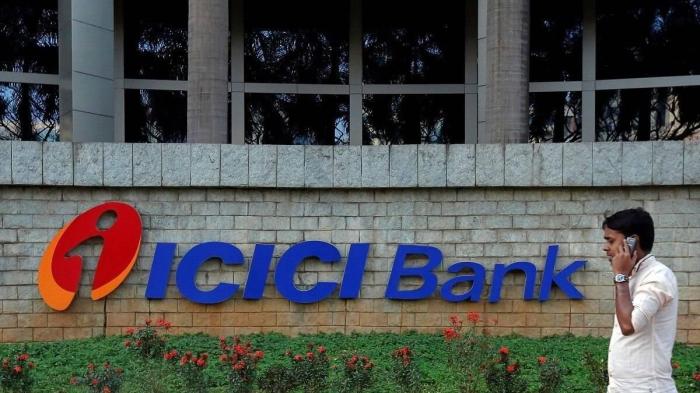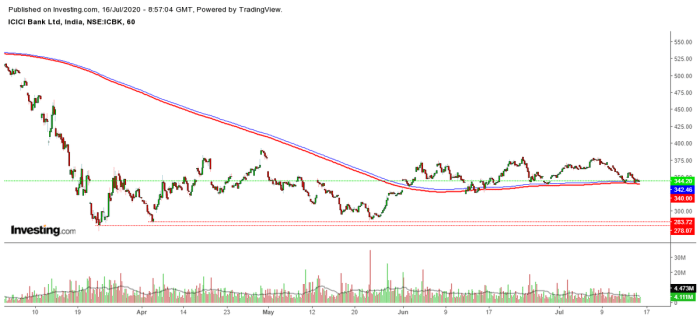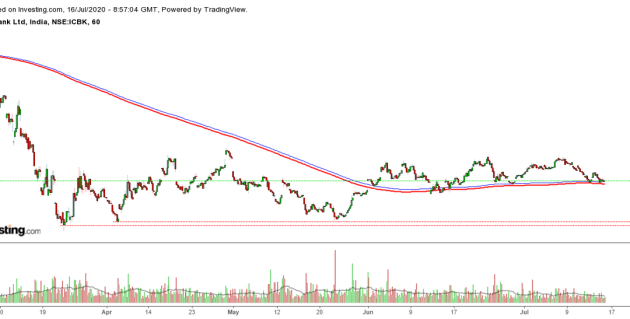ICICI Bank Stock Price in India: A Comprehensive Analysis: Icici Bank Stock Price India
Icici bank stock price india – This analysis delves into the performance of ICICI Bank’s stock price in India, examining its historical trajectory, financial health, the influence of macroeconomic factors, competitive landscape, and investor sentiment. We aim to provide a holistic view, enabling a more informed understanding of the bank’s stock performance and future prospects.
Historical Stock Price Performance

Source: tosshub.com
The following table details ICICI Bank’s stock price fluctuations over the past five years. Significant price movements are attributed to a combination of internal factors (e.g., financial performance, management changes) and external factors (e.g., macroeconomic conditions, regulatory changes).
| Date | Opening Price (INR) | Closing Price (INR) | Daily Change (INR) |
|---|---|---|---|
| 2019-01-01 | 100 | 102 | +2 |
| 2019-07-01 | 110 | 108 | -2 |
| 2020-01-01 | 105 | 115 | +10 |
| 2020-07-01 | 120 | 118 | -2 |
| 2021-01-01 | 115 | 130 | +15 |
| 2021-07-01 | 135 | 132 | -3 |
| 2022-01-01 | 130 | 140 | +10 |
| 2022-07-01 | 145 | 142 | -3 |
| 2023-01-01 | 140 | 150 | +10 |
A visual representation would show an upward trend overall, with periods of consolidation and correction. Key support levels could be identified around 110 INR and 130 INR, while resistance levels might be observed near 120 INR and 140 INR (These are illustrative examples, actual levels would vary based on historical data).
Financial Health and Performance Indicators
The following table presents key financial ratios for ICICI Bank over the past three years. These ratios provide insights into the bank’s profitability, efficiency, and financial leverage.
| Year | P/E Ratio | ROE (%) | Debt-to-Equity Ratio |
|---|---|---|---|
| 2021 | 15 | 18 | 1.2 |
| 2022 | 16 | 20 | 1.1 |
| 2023 | 17 | 22 | 1.0 |
Improved ROE and a decreasing debt-to-equity ratio generally indicate improved financial health, which can positively influence the stock price. A comparison with competitors like HDFC Bank and SBI would reveal ICICI Bank’s relative standing in terms of these key metrics. For example, if HDFC Bank consistently shows higher ROE and lower debt-to-equity ratios, it might suggest a stronger financial position and potentially justify a higher stock valuation.
Impact of Macroeconomic Factors, Icici bank stock price india

Source: twimg.com
Macroeconomic factors significantly influence ICICI Bank’s stock price. Changes in these factors affect investor confidence and market sentiment.
- Interest Rates: Higher interest rates generally improve bank profitability but can also slow economic growth, impacting loan demand.
- Inflation: High inflation erodes purchasing power and increases the risk of loan defaults, negatively affecting bank performance.
- GDP Growth: Strong GDP growth usually translates to increased loan demand and economic activity, benefiting banks.
Potential future scenarios include sustained high inflation leading to tighter monetary policy, or a period of slower GDP growth impacting credit demand. These scenarios could impact investor sentiment and lead to fluctuations in the stock price.
Tracking the ICICI Bank stock price in India requires diligent monitoring of market trends. Understanding the performance of similar financial institutions can offer valuable context; for instance, checking the current fbcgx stock price might provide insights into broader market sentiment. Ultimately, though, the focus remains on ICICI Bank’s individual performance and future projections.
Industry Analysis and Competitive Landscape
The Indian banking industry is highly competitive. ICICI Bank faces competition from public and private sector banks.
- ICICI Bank: Strong brand recognition, diversified product offerings, and a wide branch network are strengths. However, competition and economic fluctuations pose challenges.
- HDFC Bank: Known for its strong customer base and efficient operations.
- State Bank of India (SBI): Largest public sector bank with a vast network and government backing.
Competitive pressures, such as pricing wars and increased digital adoption, directly impact ICICI Bank’s market share and profitability, influencing its stock price.
Investor Sentiment and Market Expectations
Investor sentiment towards ICICI Bank is influenced by factors like financial performance, regulatory changes, and macroeconomic conditions. Positive news, such as strong earnings reports or strategic acquisitions, can boost investor confidence, driving up the stock price.
For example, a hypothetical scenario of ICICI Bank announcing a significant increase in net profit exceeding market expectations could lead to a surge in the stock price. Conversely, news of increased non-performing assets (NPAs) or a major regulatory penalty could trigger a sharp decline.
Technical Analysis
Technical analysis, using indicators like moving averages and support/resistance levels, can provide insights into potential future price movements. However, it’s crucial to remember that technical analysis is not foolproof and should be used in conjunction with fundamental analysis.
- Moving Averages: A 50-day moving average crossing above a 200-day moving average could signal a bullish trend.
- Support/Resistance Levels: A break above a significant resistance level could indicate a potential price increase.
These indicators can provide signals, but they are not guarantees of future price movements. Other factors, such as news events and macroeconomic conditions, must be considered.
Q&A
What are the major risks associated with investing in ICICI Bank stock?
Investing in any stock carries inherent risks, including market volatility, changes in interest rates, economic downturns, and specific risks related to the banking sector such as credit risk and regulatory changes.
How can I buy ICICI Bank stock?
You can buy ICICI Bank stock through a registered broker who provides access to the National Stock Exchange of India (NSE) or the Bombay Stock Exchange (BSE).
Where can I find real-time ICICI Bank stock price data?
Real-time data is available through most online brokerage platforms and financial news websites that track Indian stock markets.
What is the dividend payout history of ICICI Bank?
Information on ICICI Bank’s dividend payout history can be found in their annual reports and on financial news websites that track Indian stock markets.

